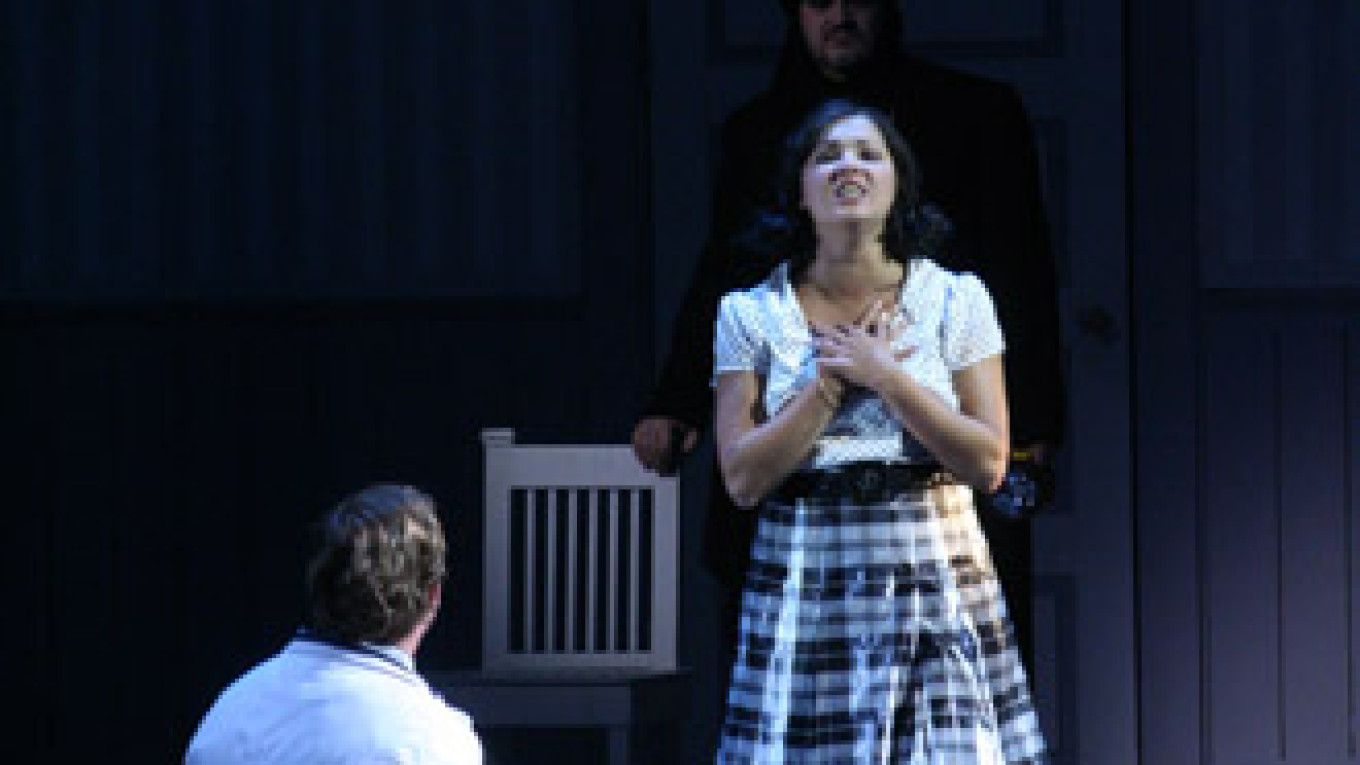The 227th season of St. Petersburg’s Mariinsky Theater got off to an astoundingly good start last week with the debut of a new production of Pyotr Tchaikovsky’s opera “Iolanta,” co-produced by the Mariinsky with the Festspielhaus of Baden-Baden, Germany, where it premiered in July.
Until last week, my only encounters with “Iolanta” had been four productions by Moscow opera companies seen here during the past decade or so. From those, I gained the impression that “Iolanta,” though quite beautiful in parts, could hardly be counted among its composer’s major achievements.
All of that changed, however, with the Mariinsky’s performance last week. Thanks to a cast of principals, a conductor and a staging of a quality that far exceeded any I had ever before witnessed in “Iolanta,” the opera emerged both musically and dramatically as a truly noble work, worthy to be placed alongside the composer’s “Eugene Onegin” and “The Queen of Spades,” as well as his unjustly neglected “Cherevichki.”
Tchaikovsky wrote “Iolanta” to a libretto by his brother, Modest, who based his text on a once-popular play by Danish writer Henrik Hertz. The opera premiered at the Mariinsky in December 1892, in a double bill with the composer’s ballet “The Nutcracker.” Soon afterward, however, the opera and ballet parted company, “Iolanta,” which Tchaikovsky himself considered much the finer of the pair, largely falling by the wayside until fairly recent times. “The Nutcracker” went on to become probably the most frequently performed of all ballets.
“Iolanta” tells of a princess, blind from birth, who, at the command of her father, King Rene of Provence, is kept secluded from the world and unaware of her handicap. A Burgundian knight named Vaudemont blunders into Iolanta’s abode, discloses to her that she is blind and awakens in her the sensation of love. With love at her command, Iolanta miraculously gains the gift of sight.
Though I’m not unreservedly a fan of the Mariinsky boss Valery Gergiyev, I’ve long found him a peerless conductor of Russian opera. And at “Iolanta” last week, he was in top form. The opera’s score contains much that seems to mark the path Tchaikovsky’s music might have taken had his life not been cut short just a year after the opera’s premiere. In particular, many of the score’s earlier pages are filled with sounds almost eerily akin to those found in Claude Debussy’s opera “Pelleas et Melisande,” composed a decade later. And thanks to Gergiyev, those sounds, for the first time in my experience, were given full value. Thanks also to him, the opera’s closing scenes rang out more truly triumphant than I had ever before heard them played and sung.
The title role at last week’s performance was taken by glamorous superstar soprano Anna Netrebko. There was nothing, however, either glamorous or superstar about the way she played it. From the very first moment, her Iolanta was simply Iolanta, making the transition from darkness and bewilderment to the joys of love and eventually to sight with extraordinary conviction. Netrebko’s voice may not be the crystal-clear instrument it was in earlier days, but it still remains remarkably beautiful and seems to have gained much of late by way of drama and intensity.
Playing the youthful Vaudemont and his companion, Duke Robert of Burgundy, were tenor Sergei Skorokhodov and baritone Alexei Markov, two of the most gifted young singing actors to be found in Russia today. Skorokhodov possesses a strong, clear voice, with an exceptionally winning upper register. Singing with great distinction in a single performance at the Bolshoi Theater two years ago at the premiere of its current “Boris Godunov,” he was then curiously passed over in favor of a much less talented singer. Since then, he has gone on to become one of the Mariinsky’s principal treasures. Markov, the winner of a Golden Mask award last April, also has a voice of superlative quality. Indeed, I can’t recall ever having heard Duke Robert’s famous aria in praise of his beloved Mathilde sung with greater spirit or such sheer beauty.
The staging of “Iolanta” fell to Mariusz Trelinski, artistic director of Warsaw’s Grand Theater — National Opera, who told the opera’s story with clarity and imagination and moved his cast about the stage in a meaningful fashion.
Central to the decor, by Slovakian designer Boris Kudlicka, was a large cube, open on three sides that served as Iolanta’s bedroom and revolved at times to reveal the entrance to her place of safekeeping. In a novel approach by the director and designer, that place proved to be a humble dwelling in the midst of a dark forest, a better choice to isolate Iolanta than the grand castle that she inhabits in most productions.
Moscow will almost certainly soon have a chance to see the Mariinsky’s “Iolanta,” as part of the array of “Mariinsky Premieres” presented annually under Golden Mask Festival auspices.
A Message from The Moscow Times:
Dear readers,
We are facing unprecedented challenges. Russia's Prosecutor General's Office has designated The Moscow Times as an "undesirable" organization, criminalizing our work and putting our staff at risk of prosecution. This follows our earlier unjust labeling as a "foreign agent."
These actions are direct attempts to silence independent journalism in Russia. The authorities claim our work "discredits the decisions of the Russian leadership." We see things differently: we strive to provide accurate, unbiased reporting on Russia.
We, the journalists of The Moscow Times, refuse to be silenced. But to continue our work, we need your help.
Your support, no matter how small, makes a world of difference. If you can, please support us monthly starting from just $2. It's quick to set up, and every contribution makes a significant impact.
By supporting The Moscow Times, you're defending open, independent journalism in the face of repression. Thank you for standing with us.
Remind me later.


